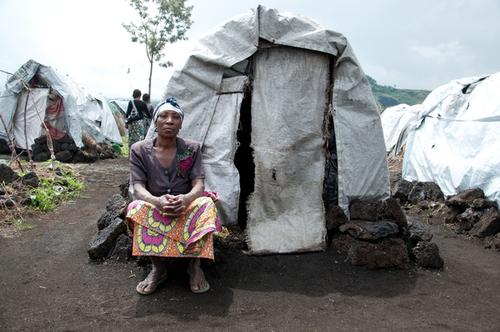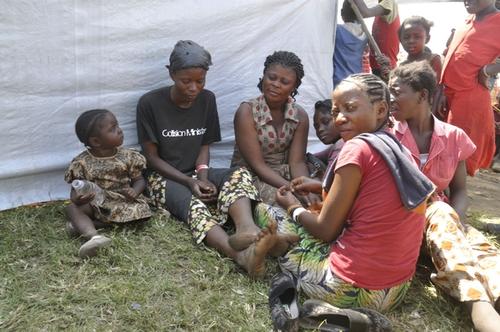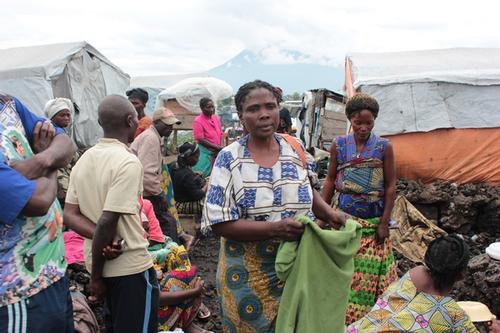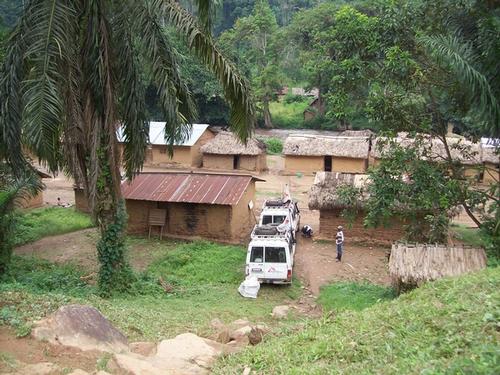Some 5000 people have found refuge in Sotraki Stadium in the wake of clashes at the end of May between the rebel group M23 and the Congolese army. Médecins Sans Frontières (MSF) has established a mobile clinic to provide medical care at this transitional site located a dozen kilometres from Goma, the principal town of North Kivu province in the Democratic Republic of Congo (DRC). In the Bulengo and Mugunga III camps MSF teams are now working at hospitalisation centres and are again seeing patients after a 24-hour interruption for security reasons. The security situation nevertheless remains volatile, and humanitarian needs are pressing.

The Sotraki transitional camp
Nearly 5,000 persons have fled villages located near the front lines of fighting that erupted the week of 20 May. After spending several nights in schools and parishes outside Goma, these displaced persons were assembled at Sotraki Stadium to facilitate delivery of humanitarian aid.
“The shells were falling on houses … My house was destroyed, and I couldn’t take a thing with me,” said Gertrude, who got to the site with her five children and 10 nephews and nieces. Some displaced persons were able to hastily get together a few personal effects such as pans or clothes, but the majority fled hurriedly. A large number were hungry: they reported not having eaten for a number of days. Some families were separated as they fled. This was not the first such experience for many of these displaced persons. Most had also fled their homes during the fighting in November 2012; some remember fleeing in 2008, and even 1994.
MSF established a mobile clinic as soon as the displaced persons arrived, treating over a hundred people a day. The most frequently-treated illnesses are diarrhoea and respiratory infections. “A quarter of the illneses we are treating are cases of diarrhoea, mostly children under five years old,” said Carolina Lopez, MSF emergency coordinator. “Thirty five per cent of our patients are seeing us for acute respiratory infections which affects adults and children equally. Many of these illnesses are due to night after night of sleeping under the stars. Overcrowding, un-cleanliness, dust … all of this breeds these illnesses.”
In addition, MSF is trying to prevent an outbreak of cholera. “There are already patients suffering from cholera in other camps outside Goma—we absolutely have to avoid the spread of this disease.” said Lopez. MSF has set up a cholera treatment centre at the Buhimba refugee camp which has been running for several months now.
Humanitarian situation still critical
Medical activity has resumed at the Bulengo refugee camp. The MSF team is simultaneously providing basic care, vaccinations, and maternal health services. Humanitarian needs are huge at this site, which has been open since November 2012. Because Bulengo is not an official camp, it receives only sporadic aid from humanitarian aid providers, and camp security is poor. Since November 2012 there has been only one distribution of essential items. “We need plastic sheeting most of all. Some people did get some some, but it’s been all torn up for a long time now,” said Sifa, who lives in the camp.
Relative calm returns
Since the fighting that took place a few kilometers away, in the direction of Sake and Goma, the presence of uniformed men in the surrounding forest has posed a concern for families. “You can’t go for firewood in the forest, because you might get raped, so we have to sell corn to buy charcoal for cooking,” said Siada, who lives in the camp.
Sexual assualts are commonplace at Bulengo, where 114 rapes have been reported since the beginning of December 2012. Similar circumstances prevail at the Mugunga III camp, where medical teams observed a massive increase in sexual assaults just after the clashes, occasionally treating as many as 28 female patients a day. Rapes generally occur outside the camps, just near the front lines.
Crime is also common in the areas surrounding the camps. A woman and her baby were seriously injured recently, during an assault several hundred metres from the entrance to Bulengo.
MSF is providing basic and specialist healthcare in North Kivu province. On the outskirts of Goma , MSF is working in the camps at Bulengo and Mugunga III and, since the end of May, in Sotraki Stadium as well. Elsewhere in North Kivu MSF is supporting referral hospitals in Mweso, Pinga, Masisi, Rutshuru, Walikale, and Kitchanga, working in health centres, and operating mobile clinics.





